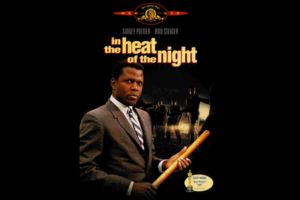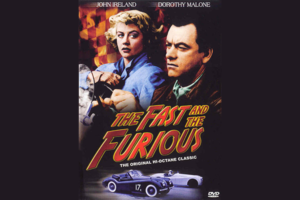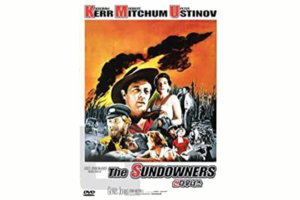
It was one of those transient motels, something between a fleabag and a dive. – Farewell, My Lovely (1975)


Hello to all of the classic people that are returning. I am glad you are back. I want to welcome any new visitors. Today on Classic Movie Review, we are taking on Farewell, My Lovely (1975). This film is a Neo-Noir remake of the classic Film Noir Murder, My Sweet (1944). An earliest film, The Falcon Takes Over (1942), was the first movie based on this novel by Raymond Chandler. The star of today’s film is what makes this film stand out.
It was pretty quiet this month. I need your input to make the show better, and if you have time, please leave a review.
iMDB.com has this film rated at a 7.0.[1] To me, that is a meager rating. However, I think that is about right for this film, in some ways. As a devoted noiresta, there are many reasons why I would watch this film. While the average viewer may find some of the plot points dated and some of the choice of actors odd.
Rottentomatoes.com has this film rated at 67 percent on the Tomatometer and 73 percent audience approval, mirroring the rating on iMDB.com.
The great film critic Roger Ebert liked the film and said in a January 1, 1975, four-star review:
“‘Farewell, My Lovely’ never steps wrong.
It is, indeed, the most evocative of all the private detective movies we have had in the last few years. It is not as great as Roman Polanski’s “Chinatown,” which was concerned with larger subjects, but in the genre itself there hasn’t been anything this good since Hollywood was doing Philip Marlowe the first time around. One reason is that Dick Richards, the director, takes his material and character absolutely seriously. He is not uneasy with it, as Robert Altman was when he had Elliot Gould flirt with seriousness in “The Long Goodbye:” Richards doesn’t hedge his bet.
And neither does Robert Mitchum, in what becomes his definitive performance. Mitchum is one of the great screen presences, and at 57 he seems somehow to be just now coming of age: He was born to play the weary, cynical, doggedly romantic Marlowe. His voice and his face and the way he lights his cigarette are all exactly right, and seem totally effortless. That’s his trademark. In a good Mitchum performance, we are never aware he is acting. And it is only when we measure the distances between his characters that we can see what he is doing.”[2]
New York Times film critic Richard Eder said in an August 14, 1975 review:
“It has been touched up with a little contemporary sex and violence and more than a little contemporary cinematic self-indulgence. It’s as if someone had put pillow springs, power-steering and a tape deck into a classic racing-car. It is still handsome and it still goes, but it is a handsome mediocrity. Mr. Richards has been less ambitious than Robert Altman, who two years ago translated another Chandler work, “The Long Goodbye,” into personages and a setting totally of the seventies. “Farewell” is kept back in the forties; it is just that certain present-day movie mannerisms have been tacked on. When Marlowe, the detective—played by Robert Mitchum—erupts into a brothel, the whores earn the picture its R rating by appearing naked. In the picture’s most repugnant scene Mr. Mitchum is allowed to deal the fat old woman—admittedly, a villainess—a crunching and bloody blow in the face. The camera can linger endlessly on yellow and brown interiors, on neon lights, on the technicolored dilapidation of back-alley Los Angeles. It is a movie interlarded with photography; about 15 excess minutes’ worth. Chandler plots can be confusing in the movies: people still argue about just what happened at the end of Howard Hawks’s version of “The Big Sleep.” “Farewell” deals with the efforts of Marlowe to track down a mysterious Velma, the lost love of a great, hulking ex-con who wants her back even though she hasn’t written him all the years he was in jail. Marlowe’s search, which cuts across a swath of metropolitan corruption, is attended by elusive clues, red herrings—blood-red, usually—and a great many corpses. So much is unresolved along the way that the few violent minutes of elucidation at the end produce some confusion. If you are a critic you can refer to a synopsis. If you are a member of the audience you may have to read the book, or perhaps pay to sit through another showing. The strengths of this movie are in Mr. Chandler and in the high quality of a lot of the acting. The author’s lines, tough, funny and baroque, get full value.”[3]
Actors – Farewell, My Lovely (1975)
Returning
We have a lot of returning actors this time. The first of which Robert Mitchum as Marlowe makes the whole thing work. He is a beaten-down private investigator. Maybe not as far gone as Ira Well (Art Carney) in The Late Show (1977), but getting there. Mitchum was first covered in one of the greatest Film Noirs, Out of the Past (1947).
Charlotte Rampling played the role of Mrs. Grayle as well as the missing Velma. Rampling was first covered in Angel Heart (1987).
John Ireland played the role of Detective Nulty. He really looked the part of a public servant at the end of a long career. Ireland was first covered in the classic western Red River (1948).
Anthony Zerbe played the role of gambler/gangster Brunette. Always up to play a bad guy, Zerbe was first covered in the fantastic post-apocalyptic thriller The Omega Man (1971).
Harry Dean Stanton was solid as cop Billy Rolfe. Stanton was first covered in Red Dawn (1984).
Joe Spinell had a small role as bone breaker Nick. Spinell was first mentioned as the Army psychiatrist in Big Wednesday (1978).
New
Sylvia Miles was outstanding as the drunken Mrs. Florian. For this role, she was nominated for the Best-Supporting actress Oscar. Miles was born in 1924 in New York City. Miles went to Washington Irving High School in Manhattan. Later, she attended the Actors Studio in Hell’s Kitchen.
In 1947, at the age of 23, Miles started working in theater. She got her first television work in 1954, and her first movie role in Murder Inc. (1960), a nice little New York gangster film.
Miles was in many films, but they were generally more minor roles. Some of her earlier films include Parrish (1961), Violent Midnight (1963), and Pie in the Sky (1964). She was in the 1960 Carl Reiner television pilot for “Head of the Family” during this same period. She played the role of Sally Rogers, who was one of the comedy writers. The show was picked up at “The Dick Van Dyke Show” 1961—1966, but Miles’ role went to Rose Marie.
A critical role for Miles was a short six-minute scene in the once X-rated Midnight Cowboy (1969). Miles played a kept woman who interacted with the movie’s gigolo. She was able to show her sexy side and her curvy body. Miles was nominated for a Best Supporting Actress Oscar, and it was not the shortest movie scene ever nominated.
Miles continued in films with The Last Movie (1971), Who Killed Mary What’s ‘Er Name? (1971), Heat (1972), and Farewell, My Lovely (1975), where she received her second Oscar nomination for Best Supporting Actress. This time, the scene was about eight minutes long.
Movies that followed include 92 in the Shade (1975), The Great Scout & Cathouse Thursday (1976), The Sentinel (1977), Zero to Sixty (1978), Shalimar (1978), The Funhouse (1981), Evil Under the Sun (1982), Critical Condition (1987), and Sleeping Beauty (1987).
In Crossing Delancey (1988), Miles played the role of the shadchante or marriage broker. Miles’ other key films include Spike of Bensonhurst (1988), She-Devil (1989), and she played the high-end realtor in Wall Street (1987).
Miles continued working when she could, and her films during this period include Denise Calls Up (1995), High Times’ Potluck (2002), Go Go Tales (2007), and returning as the realtor in the sequel Wall Street: Money Never Sleeps (2010). Miles died in 2019 at the age of 94.
Story – Farewell, My Lovely (1975)
The story was set in Los Angeles in 1941. Dark streets are shown with lots of neon lights.
Looking out the window of the flea-bitten Casa Marina Hotel, private detective Philip Marlowe (Robert Mitchum) stares as he drinks and smokes. He reflects on feeling old and the bad cases he has been having.
Marlowe is hiding in the hotel in an attempt to avoid the police. At last, he calls Lt. Nulty (John Ireland) and lets the cop know where he is holed up. Marlowe tells Nulty to come alone, but Nulty wants to know if Moose is in the room. Marlowe doesn’t tell.
Cop Billy Rolfe (Harry Dean Stanton) brings the Commissioner (Logan Ramsey) into Nulty’s office. The Commissioner says there have been seven murders, and he wants Marlowe brought in. He also tells Nulty it is not a good idea to go by himself.
Nulty arrives at the hotel but leaves Rolfe in the car. Marlowe lets the cop into the dirty room. Marlowe is determined to tell his version of the story before being brought to the police station. Marlowe says that he was working on a missing teenager investigation. Marlowe is inside a dime-a-dance joint. He finds the girl and takes her outside to be turned over to her parents. Watching from the other side of the dance floor is Moose Malloy (Jack O’Halloran).
Moose follows Marlowe outside as he delivers the teenager. Moose is a giant, standing six feet, six inches. However, all I can see is the hulking dumb-dumb from Superman II (1980). Moose asks Marlowe what he does for a living. Marlowe tries to get away, but a car comes by and tries to shoot Moose before he can leave. The shooter is Cowboy (Burton Gilliam) of Blazing Saddles (1974).
Moose doesn’t care that he has been shot at. He tells Marlowe that he wants him to find Velma Valento. Velma was his girl before Moose was sent to prison for a seven-year bank robbery stretch. Moose says he hasn’t seen her in seven years, and she hasn’t written in six years. Moose tells that he stole $80,000 in a solo job. Marlowe tries to convince the giant to forget about Velma, but it is not happening.
Moose insists that Marlowe go with him to Florian’s nightclub, which was the last place he knew that Velma worked. Florian’s is downtown, and everyone except Moose and Marlowe is black. Moose insists they go inside. Moose manhandles the bartender (Harry Caesar), and the young bouncer is called in to get rid of Moose. It works out very poorly for the bouncer.
Moose goes in the back to talk to the owner Montgomery. Off-screen, he lifts the man up on the wall. The owner pulls a gun, and Moose kills him. Marlowe tells Moose to leave before the police arrive. Moose gives Marlowe fifty bucks. Marlowe called Nulty, and sometime later, the cops showed up. Marlowe says it was self-defense. They have a few racial quips.
Marlowe goes to a hotel across the street and bribes the clerk (Napoleon Whiting) for information. The clerk says a man in room 210 used to play in the band at Florian’s. Marlowe is let into the room. Tommy Ray (Walter McGinn) is white, his wife is black, and their son is of mixed race. Marlowe says he is looking for Velma. Tommy tells that Florian is dead, but his wife, Jessie (Sylvia Miles), may still be alive. Marlowe is friendly to the small boy who identifies as a baseball player. Tommy has changed his mind and gave Marlowe Jessie’s address and advice to take a pint of bourbon along.
Marlowe drives to the dilapidated house. Jessie is delighted to have a friend with a bottle. Jessie looks road hard and put up wet, wearing only a tattered robe. Marlowe tells her who he is looking for, and Jessie asks for a drink. Jessie drinks and talks about her past in show business. Jessie says she doesn’t know where Velma is, but she may be able to find out where she is located. Jessie says she doesn’t understand why Tommy would lie about knowing Velma when they had worked together in the past. Jessie calls Tommy, and she convinces him to trust Marlowe.
Marlowe goes back to the hotel and is delivered the picture via Tommy’s son. Marlowe goes to a burlesque club and is given the name of a talent agent. The agent says the picture is of Linda Gilbert. He says she did a couple of pictures before losing her mind and being sent to an insane asylum. Marlowe visits the woman at the asylum, and she is completely catatonic.
Marlowe goes back to his office, and Lindsay Marriott (John O’Leary) is waiting to talk to him. Marriott says that a friend had her valuable jade necklace stolen. He is taking $15,000 to ransom it back from the criminals. Marlowe is suspicious, but he takes the job for one hundred dollars. Marlowe and Marriott plan on meeting that night at 8:00 P.M.
As Marriott leaves, Nulty and Rolfe arrive. The cops are looking for Moose. Marlowe pushes Nulty to find out why he is so interested in Moose. He is not given the answer.
Marlowe goes to a Chinese restaurant for supper. Moose arrives, and Marlowe tells about Velma being in the insane asylum. Moose looks at the picture and says it is not Velma before he leaves. Marlowe drives back to Tommy’s house, and the man has not been home all day.
That night, Marlowe meets with Marriott. Marriott hides in the backseat. Marlowe has the money and drives down to the barrier at the end of the canyon road. Marlowe gets out of the car to look around, and he is knocked out from behind by a man.
When he wakes later, a policeman is shining a flashlight in his eyes. When they walk by the car, Marriott has been murdered. They haul Marlowe in and interrogate him. Marlowe talks his way out of the crime. When Marlowe is released, he desperately wants to know who is trying to frame him. Nulty tells Marlowe that Moose has gone to Mexico.
Marlowe gets a tip from a fence to go to a place in Chinatown to find out about jade. The Chinese fence (Jerry Fujikawa) tells him that the only one with the missing type of jade is Baxter Wilson Grayle (Jim Thompson).
Marlowe drives to Grayle’s mansion. Grayle is very powerful in Los Angeles politics. Marlowe is let into the house, where he is introduced to Grayle’s wife, Helen (Charlotte Rampling). Grayle tells Marlowe that none of their jade is missing. Helen sends her much older husband away. She wants Marlowe to find Marriott’s killer. Then she tries really hard to put her hooks into Marlowe. He ends up kissing her on the couch and is busted by Grayle.
Back at his office, Marlowe is attacked by Cowboy, Jonnie (Sylvester Stallone), and Nick (Joe Spinell). The three henchmen take Marlowe to meet with professional madam Frances Amthor (Kate Murtaugh). At the cathouse, the prostitutes are all sitting around the dinner table. Amthor says she wants to talk to Moose. She beats him pretty good for talking back. He hits her in the mouth, and guns are drawn. Amthor shoots Marlowe up with heroin and throws him in a backroom.
When Marlowe wakes, he finds Tommy’s dead body. Marlowe makes himself wake up by sheer willpower. When he hears someone coming into the room, he pretends to be dead. Cowboy comes in, and Marlowe jumps him and takes his gun. Marlowe goes through the bordello looking for Amthor until he finds her in a room counting money.
Marlowe wants to know why she had him kidnapped. Before she can answer, a prostitute runs in and says Jonnie is with Doris. Amthor runs out of the room. Amthor starts beating the crap out of Doris. Jonnie fires two rounds into the madam ending her life. Marlowe escapes from the house.
Marlowe makes it to Georgie’s (Jimmie Archie) apartment. Georgie sells newspapers and had been a prizefighter when he was younger. It takes Marlowe some time, but he gets back on his feet with the help of Georgie. Marlowe says that he told Tommy’s wife and son that he was dead.
In his office, Marlowe gets a call from Helen. She invites him to a private political party at the White Orchid Club. Marlowe goes to the event in it all very bougie. The club is owned by Laird Brunette (Anthony Zerbe). Brunette is a gangster and is friends with Grayle. Marlowe knows Brunette from when he worked in the District Attorney’s Office.
Marlowe asks Brunette about Marriott, but there is nothing to learn. Brunette offers Marlowe $2,000 if Marlowe can arrange for him to talk with Moose. Brunette gives Marlowe the cash. Marlowe leaves with Helen. They have a little thing in the car by the beach.
Later that night, someone fires two shots into Marlowe’s car. He is sure they missed him on purpose but doesn’t know who is trying to send a message.
The next day, Jessie calls Marlowe to come over. He brings her a new bottle. Marlowe tells that Tommy is dead and the picture of Velma was phony. Jessie says that Velma contacted her and wants to speak to Moose. Marlowe knows he is being followed by Brunette’s men.
In his office, Marlowe gets a call from Moose. He tells Moose that Velma wants to talk to him. Moose says he doesn’t know Grayle or Burnette. Marlowe meets with Moose at Georgie’s apartment. The phone rings, the voice on the other end is Velma, and Moose is thrilled. He tries to give Marlowe some money, but he is broke. Marlowe gives him a few dollars.
Moose and Marlowe leave to meet Velma. The meet location is a dirty little hotel on the outskirts of town. Marlowe drops Moose off. As he is turning around, he sees another sedan in the alley. He blocks Moose with his car and saves the big man’s life as two men open fire with automatic weapons from inside a room. Marlowe kills the two shooters. Moose bugs out, unable to accept that he has been set up by Velma.
Nulty and Rolfe come to investigate the murder. Nulty is mad that Marlowe didn’t call when Moose made contact. Marlowe and the cops go to Jessie’s house. The radio is playing loud, and they eventually find Jessie strangled in the bedroom. Marlowe puts one of his cards on the table. He then ducked out.
Back in the current time, Marlowe is in his hotel talking to Nulty. He says that his business card found on Marriott’s body was the same card he had left with Jessie. He says Moose called the night before and is still worried about Velma. Marlowe knows that whoever is behind all of the killings and the search for Moose hired Jessie to call when Moose showed up at her house. When Marlowe arrived, she made the call. He says Tommy was given inducement to give Marlowe the false picture. He thinks someone has kidnapped Velma because it was her that talked to Moose on the phone.
Marlowe says Brunette is involved, and he is going to the criminal’s yacht. Although Nulty is supposed to bring in Marlowe, he decides to allow him to go to the yacht. Marlowe and Moose meet Georgie on an arcade pier. Georgie has been beaten but says he didn’t give anything away.
Marlow and Moose boat out to the yacht. Marlowe knocks down a couple of bodyguards. They pass through the gambling room on the yacht before finding Cowboy and Nick. Marlowe pulls his gun and demands to see Brunette. Moose throws Cowboy in the ocean.
In the police car, Nulty has a change of heart and says they are going to the boat. Rolfe argues that they need to let Brunette know. Rolfe leaves the car, but the rest go ahead.
Nulty and crew are heading for the boat.
Marlowe and Moose are taken to Brunette’s stateroom. He denies knowing Velma. Moose is ready to tear Brunette’s arms off. Marlowe sees a fur coat and tells Helen to come out of the closet. Moose greets her as Velma.
Velma tells Moose that he will get his full cut of the stolen money for taking the fall alone. Marlow tells Moose that Velma was a prostitute and has now married a wealthy judge that doesn’t know about her past. He says that Brunette was behind the scheme. The only other people that knew about Velma’s past were Marriott and Amthor, who are both dead.
Velma orders Moose to take Marlowe’s gun. When Moose takes the gun, Velma shoots her old boyfriend three times. Moose dies, not knowing why Velma turned on him. Velma aims at Marlow, but he shoots first. Three of Brunette’s henchmen are outside of the door. Nulty arrives and kills Nick as the others flee.
With Nulty in the room with Brunette, Marlowe leaves, disgusted by the sordid case. Later, he takes the $2,000 to Tommy’s widow and son.
Conclusion – Farewell, My Lovely (1975)
In the novel “Farewell, My Lovely” 1940 by Raymond Chandler, Philip Marlowe was 30-something. When this film was made, Robert Mitchum was 57. It has been reported that many people thought that Mitchum was too old and out of shape for this role. Film critic Gene Siskel wrote that Mitchum “plays Marlowe with a delicious ease. He sounds just like Marlowe should sound.” I have to say, after watching this again, Mitchum knocked it out of the park.
Mitchum said that producer Elliott Kastner wanted Richard Burton for the role of Marlowe. This would have been a crime against moviedom.
Marlowe continually checks on New York Yankee Joe DiMaggio’s game hitting streak as a thread through the movies. It is shown in newspaper headlines, and Marlowe even has an ongoing bet with Georgie. Marlowe narrates about a doubleheader versus the Washington Senators. During this doubleheader, DiMaggio tied and then broke the AL record.
Just before Marlowe gives the $2,000 to Tommy’s widow, he plays an arcade baseball game. He bats the ball and is out by the third baseman. This is how DiMaggio’s streak ended by hitting it to the Cleveland Indian’s third baseman on July 17, 1941. Marlowe reads it in the newspaper following his arcade game. The streak was ended with a 56-game hitting streak[4].
DiMaggio went on to be married to Marilyn Monroe, hawked Mr. Coffee machines, and was questioned by Simon and Garfunkel.
World-Famous Short Summary – Let sleeping dogs lie
This show is now completely free and independent, brought to you without ads. If you enjoyed the show, please subscribe and leave a review where you get your Podcasts. It really helps the show get found.
As a technical note, references and citations are listed for each show on the site at classicmovierev.com.
Beware the moors.
[1] https://www.imdb.com/title/tt0072973/
[2] Farewell, My Lovely movie review (1975) | Roger Ebert
[3] https://www.nytimes.com/1975/08/14/archives/screen-detective-yarnmitchum-is-marlowe-in-new-version-of-chandlers.html
[4] Joe DiMaggio – Wikipedia










Leave a Reply
Your email is safe with us.